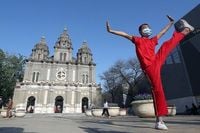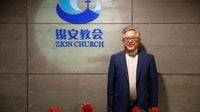On October 9, 2025, a sweeping crackdown by Chinese authorities sent shockwaves through the country’s underground Christian community. More than 30 pastors and staff members from Zion Church—one of China’s largest unregistered Christian congregations—were arrested or became unreachable to their families, according to multiple reports and statements from church representatives. The most prominent among them, Pastor Ezra Jin (also known as Jin Mingri), was detained at his home in Beihai City, Guangxi Province, a move his daughter described as both "extremely shocking and … very scary for our family." The arrests, which included forceful separations of clergy from their children and reports of violence, have prompted international condemnation and reignited debate over religious freedom in China.
According to NPR and The Economic Times, the detentions began with coordinated overnight raids in major cities including Beijing, Shanghai, and Shenzhen. Witnesses reported that police arrived with a "wanted list," and in at least one case, a female pastor was separated from her newborn baby. Sean Long, a pastor and spokesperson for Zion Church now based in the United States, told NPR that some of those arrested face criminal charges such as "illegal dissemination of religious information via the internet" and "illegal use of information networks"—an offense that can carry a maximum jail term of seven years.
Pastor Jin’s daughter, Grace Jin Drexel, who lives in the United States, told NPR and The New York Times that her father’s arrest was carried out by ten officers who searched his home. She expressed deep concern for his health, noting, "He’s been hospitalised in the past for diabetes. We’re worried since he requires medication." Lawyers have reportedly been denied access to Jin and the other detained pastors, a situation that has only increased the family’s anxiety. Jin’s wife, Liu Chunli, wrote in a letter that her heart is "filled with a mix of shock, grief, sorrow, worry, and righteous anger," asserting, "He simply did what any faithful pastor would do… He is innocent!"
The crackdown comes amid a period of heightened tension between the United States and China, particularly over trade. Just one day after the arrests, President Donald Trump threatened a 100% tariff on Chinese imports, while Beijing responded by tightening export controls on critical materials. This broader geopolitical friction has led some observers, including Zion Church’s Long, to suggest that the government views the rapid growth of Zion Church—which now reaches between 5,000 and 10,000 worshippers weekly—as a threat to its authority.
Zion Church, founded in 2007 by Pastor Jin after he left the official Protestant church, has long operated outside the state-sanctioned religious system. The Chinese Communist Party regards Christianity and Islam as "foreign" faiths, often subjecting their followers to surveillance and control. According to BBC and ChinaAid, tens of millions of Chinese worship at unregistered "house churches" rather than in government-approved congregations. The church itself has faced government pressure before: in 2018, a nationwide crackdown led to Zion Church’s closure and forced Jin into a life of surveillance and restricted movement. He was banned from leaving China, even as his wife and three children resettled in the United States.
Pastor Jin’s personal journey is deeply intertwined with China’s modern history. As a student at Peking University, he witnessed the 1989 Tiananmen Square protests—an experience that led to his conversion to Christianity, according to Reuters. He later earned a doctorate in ministry from Fuller Theological Seminary in California, yet he chose to return to China despite the risks. "Prior to the [2018] shutdown of the church, he was in the U.S. and he could have stayed in the U.S. at that point and applied for asylum … but he felt that he had to go back with the church and be with the church while it was suffering," his daughter recalled to NPR.
The current wave of arrests is being described by advocacy groups as the most extensive and coordinated crackdown on Christians in China in over four decades. ChinaAid’s founder, Bob Fu, told BBC, "This new nationwide campaign echoes the darkest days of the 1980s, when urban churches first re-emerged from the Cultural Revolution." Zion Church, in a statement, called the persecution "a public challenge to the international community," while Long appealed to the global church society: "They cannot do whatever they want without letting people know. Let our ministers and staff members be released as soon as possible. Stop arresting our members."
Official Chinese responses have been muted. At a press conference, foreign ministry spokesperson Lin Jian claimed ignorance of the arrests, stating, "The Chinese government governs religious affairs in accordance with the law, and protects the religious freedom of citizens and normal religious activities. We firmly oppose the US interfering in China’s internal affairs with so-called religious issues." Meanwhile, the government has recently implemented stricter regulations, banning unauthorized online preaching and religious training, and emphasizing the "Sinicisation" of religion—a policy aimed at bringing all faiths under closer Party control.
The United States has responded with forceful rebukes. Secretary of State Marco Rubio issued a statement on October 12, 2025, saying, "This crackdown further demonstrates how the CCP exercises hostility towards Christians who reject Party interference in their faith and choose to worship at unregistered house churches. We call on the CCP to immediately release the detained church leaders and to allow all people of faith, including members of house churches, to engage in religious activities without fear of retribution." Former Vice President Mike Pence and former Secretary of State Mike Pompeo also condemned the arrests, with calls for international pressure to secure the pastors’ release.
Despite the risks and the trauma of recent events, Zion Church leaders remain resolute. "We will still have online service and we will not stop what we are doing," Long affirmed to NPR. "We will share the good news of Jesus Christ no matter what." The church has adopted a hybrid model of online and in-person gatherings since the 2018 crackdown, continuing to grow even under government scrutiny. Long insists that Zion Church is not a political threat: "We are not criminals but Christians. We are not anti-CCP, we are not anti-China. We love our people, love our society, love our culture. We are not a Western political force. That is 100% wrong. We are a Chinese house church adhering to historic Christian faith. We are believers of Jesus. We have nothing to do with the US-China tension or competition."
As the fate of Pastor Jin and his colleagues hangs in the balance, the episode has drawn renewed attention to the struggle for religious freedom in China. For many, the story of Zion Church is a testament to faith’s endurance in the face of adversity—and a reminder that, even in the most trying times, some communities will not be silenced.


